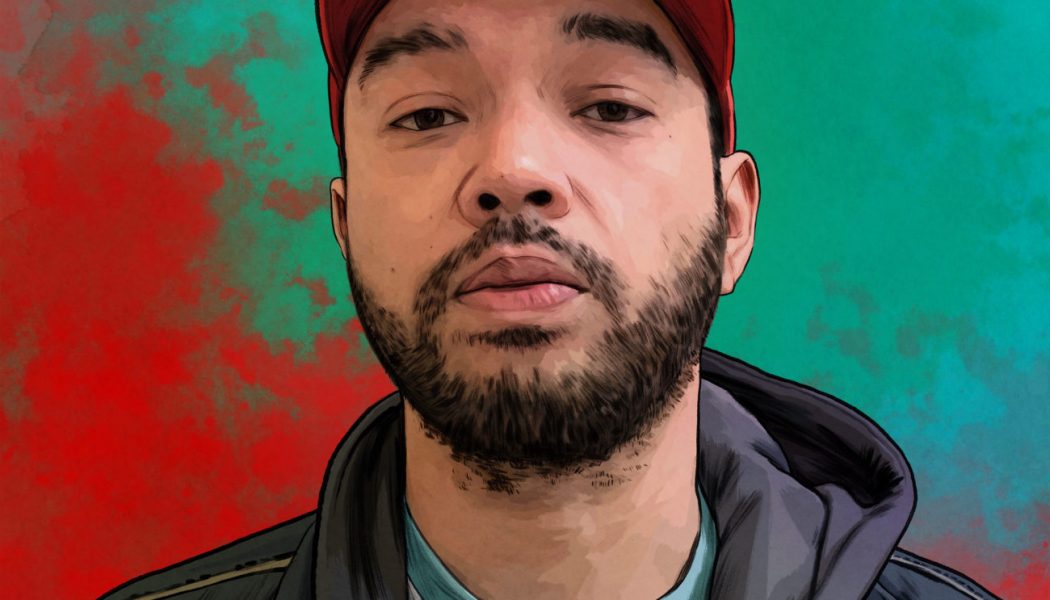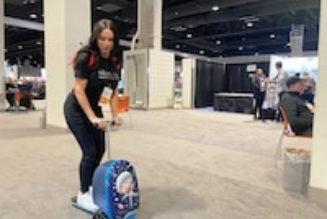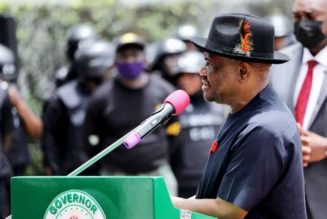
This week on The Trip podcast: Beirut-based, Syrian-Filipino rapper Chyno on Lebanon, rap, and revolution.
I’ve been thinking here in Beirut about the many-sided… let’s call them gifts, that America has given to the Middle East. And of course when you wade into it, when you look at yourself and your country in the mirror, you’ve first got to walk your mind through a vast swamp of evil action and intention. From cluster bombing to propping up Saudi hoodlums to supporting the instincts of Israel’s politics, there’s a lot to regret, past, present and future. But tucked inside the exports of empire, sort of the opposite of a poison pill, there’s also this wonderful counter-programming, an exported American liberalism, a real and instinctual belief in free speech that is a beacon for many people over here. In all our casual brutality, we have gifted the Middle East both much to complain about, and also some of the tools with which to complain.
Don’t get me wrong: when the Middle East finally liberates itself, it will be because of Middle Easterners did it. But there, cheering them on, occupying at least a corner of the debate, are some of the best aspects of America, and I’m going to put hip hop culture right there with it.
This week’s guest, Chyno, knows what I’m talking about. He is a hip hop MC and the founder of the Middle East’s first battle rap league, called the Arena. And all this speaking that the Lebanese people are doing in the streets, at the barricades, at the Egg, in Martyr’s Square, it sure sounds a lot like what the Arena has been up to for years, providing a platform for Arab battle rappers from all over the Middle East to come and speak their mind fiercely and freely, in a way that I am actually proud to recognize from my homeland. Chyno and I talk about all of that, about growing up in Saudi and Syria and the Philippines, and we talk it out over Irish coffee on a fine misty morning at The Carton store in Hamra.
Here is an edited and condensed transcript from my conversation with Chyno. Subscribers can listen to the full episode here. If you’re not on Luminary yet, subscribe and listen (and get a 1-month free trial) by signing up here.
Nathan Thornburgh: We’re here at the ground floor of The Carton shop, which is this publication right next to the Kalei Coffee Company. The first thing you said when you got here and looked around was: “Man, it’s so peaceful, you can hardly tell there’s a revolution going on.”
Chyno: Yes.
Thornburgh: It’s true. It’s leafy and a little bit rainy outside.
Chyno: The weather’s rainy, and then inside people are cozy, doing their work, laptops open, quiet.
Thornburgh: This is a question that I’ve started to ask people over the past few days: how’s the revolution going for you?
Chyno: One thing, I’m Syrian-Filipino. So at the beginning, I was going to the protests a lot. I’m definitely for it. Back in 2015, I was down there all the time. Two weeks ago, I applied for residency to stay in Lebanon, as a Syrian. So I’m staying a little bit away from that protest itself and being vocal online, because the police are actually cracking down on people they consider part of the protest, or revolutionaries, as they would call them.
And I think it’s definitely necessary. Disregarding how different factions feel about it, this is a necessary approach to having more of a real democracy, where people speak their mind and tell leaders that we think what they’re doing is wrong. Being able to say that out in the open streets is a really, really good thing.
Every country has their specific problems, but I think Lebanon is part of this huge wave of dissatisfaction.
Thornburgh: People get conditioned to fear the voice of reason a little, to fear the idea that people might actually take to the streets and demand something for themselves.
Chyno: Politics over here is meant to be divisive, and then it magnetizes certain individuals, and those individuals are attracted to that certain politics and will look to that politics as the end-all be-all. And it’s understandable in a country like this with so many different religions and sects, because they fear each other somehow, and I think the politicians fuel that fear. So it’s a weird cycle.
Thornburgh: Sometimes the most revolutionary shit is just that they’re out there together.
Chyno: Exactly. And be able to talk your stuff. To be able to say, “We don’t like this guy for saying that.” And maybe have a dialogue. I think it’s going to get violent, when you see what’s going on all over the world—we see Hong Kong, we see Iraq, we see Chile, we see all that happening and there’s an understanding of there’s some dissatisfaction of what’s going on, especially in the financial and banking system and in politics. I think we’re just part of that dissatisfaction. Everybody has their specific problems, but I think we’re part of this huge wave of dissatisfaction.
So there’s this underlying notion in the rest of the Middle East that what we have is some kind of candy revolution. But I think it’s the opposite. The way the revolutionaries here in Lebanon are galvanizing themselves and communicating with themselves to create something peaceful, and prolonging it—that’s still effective.
Thornburgh: How did your parents meet? Were they in Syria?
Chyno: No. My dad left Syria in the 80s, or late 70s. He went to the Philippines, because he had moved to Saudi Arabia for business. I think that was a recruitment agency—Saudi Arabia was trying to rebuild.
Thornburgh: Recruiting workers?
Chyno: Yes, he went to the Philippines to recruit workers to build of Saudi Arabia, because they were not really developed then.
Thornburgh: The first wave. And the Filipinos will go anywhere, do every job.
Chyno: Do every job. And Filipinos love Americans. They look up to Americans so much. And for me, coming from the Middle East, I don’t have the opposite perspective on it, exactly, but I do have a different perspective because the Middle East has had a lot more conflict with the U.S. than with Philippines in the past 30 years.
Thornburgh: So does it depend on the day of the week for you, which side you’re channeling?
Chyno: I can’t run away from Western cultural exports, I just can’t. I grew up on this stuff, and that’s why I speak like this. That’s why I do hip hop. That’s why I also have left-leaning ideas, relatively, about what’s going on in the Middle East. My ideas are liberal because of where I grew up. And because of my understanding of the Middle East, I’ll definitely have to lean left in American politics.
Nathan: So your parents met in the Philippines, but you grew up in Syria?
Chyno: Yes.
Thornburgh: You’ve lived in a bunch of different places. Do you have a place that you consider your childhood home?
Chyno: I was born in the Philippines, so that’s the most ‘childhood’ spot for me. I lived there for five or six years, and kept going back every summer. So if there’s someplace I consider my childhood, then it’s that, because I want to go back. I also grew up in Saudi Arabia for a while, but I don’t want to go back there so I don’t consider that my childhood at all. It was cool friends, cool times, then I was glad to be out.
Thornburgh: I think a lot of people who spent childhoods in Saudi Arabia had that feeling.
Chyno: Yes. I mean,childhood is pretty cool in Saudi Arabia. You can wear shorts—kind of. I remember when my mom told me I couldn’t wear shorts outside anymore. And I said, “Oh, what? Why? Why?”
Thornburgh: Why did they take your shorts away?
Chyno: Because guys a certain age—when they reach puberty—can’t wear shorts any more.
Thornburgh: It’s like once your balls drop… Those quiet rules of the kingdom that I’m not aware of.
Chyno: Yes. Jeddah, where I was, was more lenient as well. I had a good time. I met a lot of Americans. There were a lot of Americans over there, a lot of British people who were friends with my mom at that time, especially post-Gulf War, early to mid-90s. So many Americans and British people there. Life was all right over there, pretty Western too.
Thornburgh: But you were in the expat bubble.
Chyno: Exactly. I played baseball for six years. I know how to throw a slider. I played shortstop and pitcher. Stuff that nobody where I’m from would usually experience.
Thornburgh: The number of Syrians who’ve got a wicked slider from childhood is probably lower than you might think, right?
Chyno: Yes.
Thornburgh: And then you decided to go to a university in Beirut.
Chyno: My dad wanted me somewhere where I would get a good education. I went to LAU, Lebanese American University to study business, which is top class in Lebanon.
Thornburgh: And you were going to go into banking.
Chyno: Yes. I was a finance graduate. I worked in the Treasury of Syria after I graduated.
Hip hop is the only culture that I feel assimilated to, more than any other place, or any other culture.
Thornburgh: So you were doing banking for a little while. But you grew up as this kid on the move, in these expat bubbles, in Saudi Arabia and so on, consuming American culture. Is that where hip hop took root in your mind?
Chyno: Yes. Around early ’93. That expat bubble happened when my mother started meeting a lot of Filipinos married to Americans, who introduced her to American couples. Meanwhile hip hop was permeating into local Middle Eastern culture. There were the hats with the metal frames, and the baggy pants with the shoes—the MC Hammer outfit with the super baggy pants.
Nathan: Like re-importing the salwaar kameez. From Oakland.
Chyno: I thought that stuff was really cool. I’d never seen anything like it, so I was into that culture before I even meet any Americans. And I didn’t have a lot of friends, because I didn’t speak Arabic that well. So I went down and met a few friends, but watching “Hip Hop Hooray” by Naughty by Nature, that was the coolest thing for me, all these people dressed up so uniquely and awesomely, and having such a good time at the basketball court, throwing their hands in the air. I thought, “What is this thing that is so communal and awesome? This is so different. I’ve never seen anything like this. They’re all together. They’re singing together. It’s awesome. Where is this place, and what is this thing?” And from then on I really loved hip hop. Hip hop is the only culture to which I feel assimilated, more than any other place, or any other culture.
I am fluent in hip hop, in any language, so I could go to anywhere and break it down with anybody, from when it started until now. I don’t feel alienated by my beliefs when it comes to hip hop. But when I’m here, in the Middle East, the way I think is a bit alien to some people, and it’s the same in the Philippines, and it was the same when I was living in Barcelona, for a while. Hip hop is this safe spot for me. And I’m lucky enough to have been doing it over here in Lebanon for over 10 years, and being able to nurture the hip hop community here in multiple ways, not just in being friends with them. That’s, I think, the most important part with a lot of the artists. But also creating platforms for them that I find interesting, like the battle rap thing that we do over here.
Thornburgh: Tell me about the scene in Lebanon. This is a lot freer than a lot of the countries where these artists come from. Does that give Lebanon a natural role as a meeting point for regional hip hop?
Chyno: The beauty about the Arena, the battle rap league over here, is because it’s regional, so we bring in these multiple rappers from different regions and their politics is so different than ours. There are a lot of things they can’t say, where they’re from. So when they come over here, a lot of times they don’t even expect that we’ll be able to say what we say, because they’ve never got to say it over there. I don’t want to sound like I’m making battle rap bigger than what it actually is in the Middle East, but with what’s going on in the revolution right now—people making songs cursing out ministers—I think our battles are a prerequisite for that.









